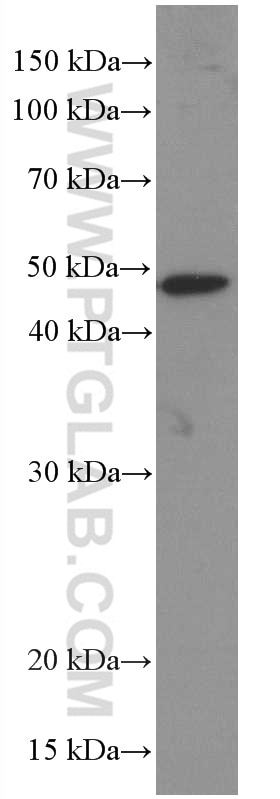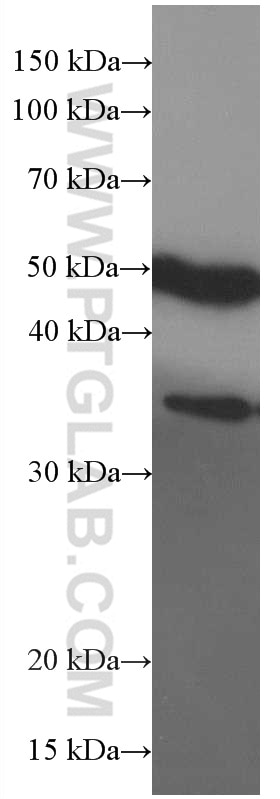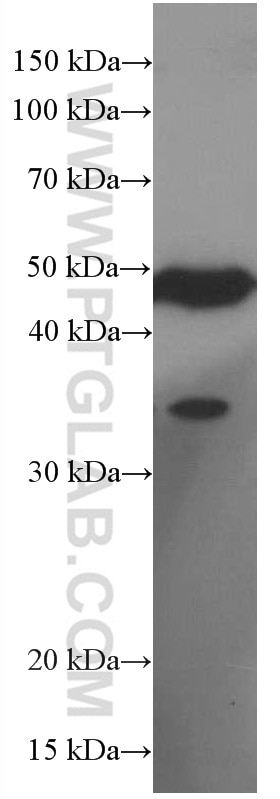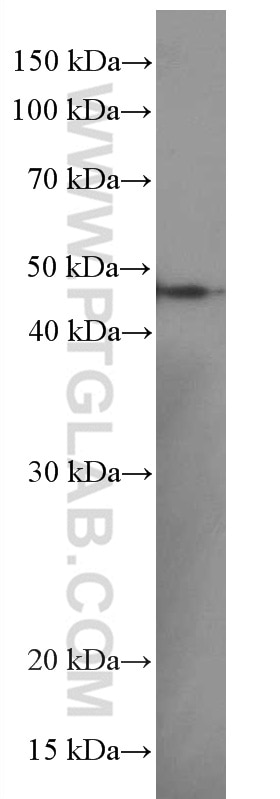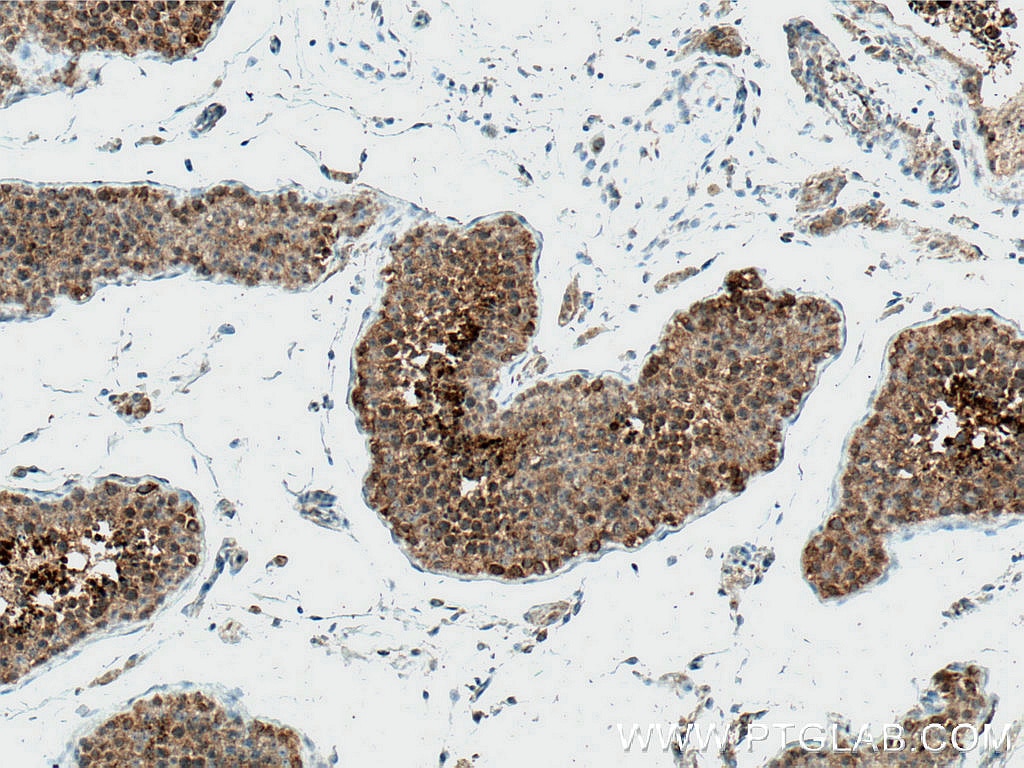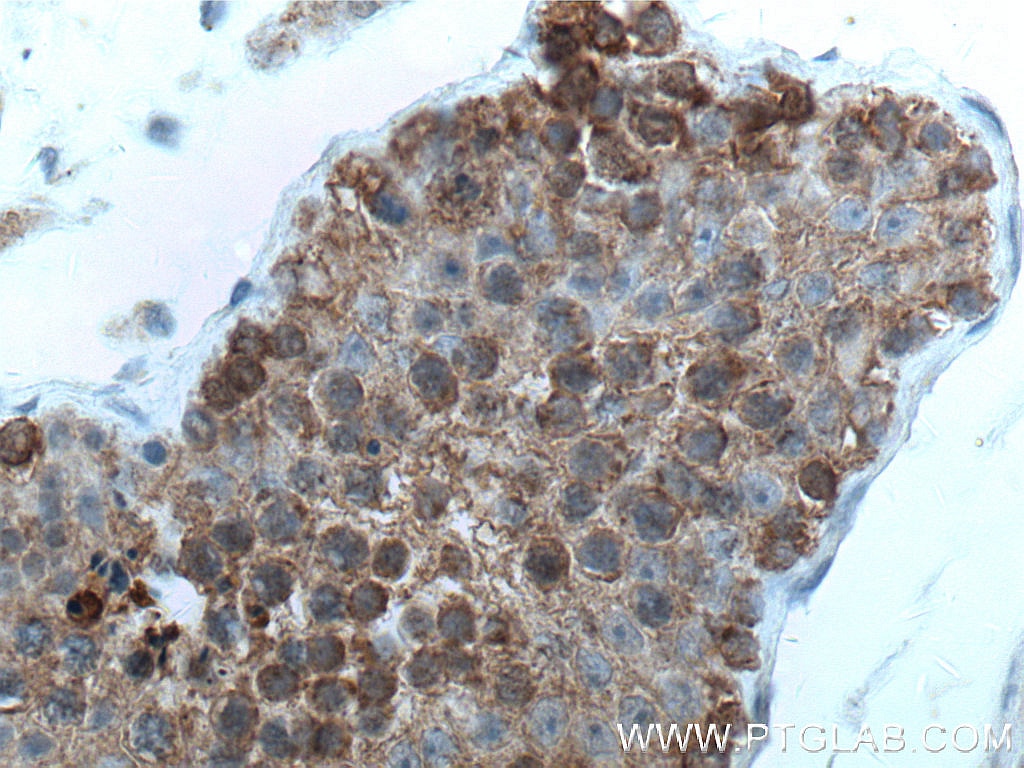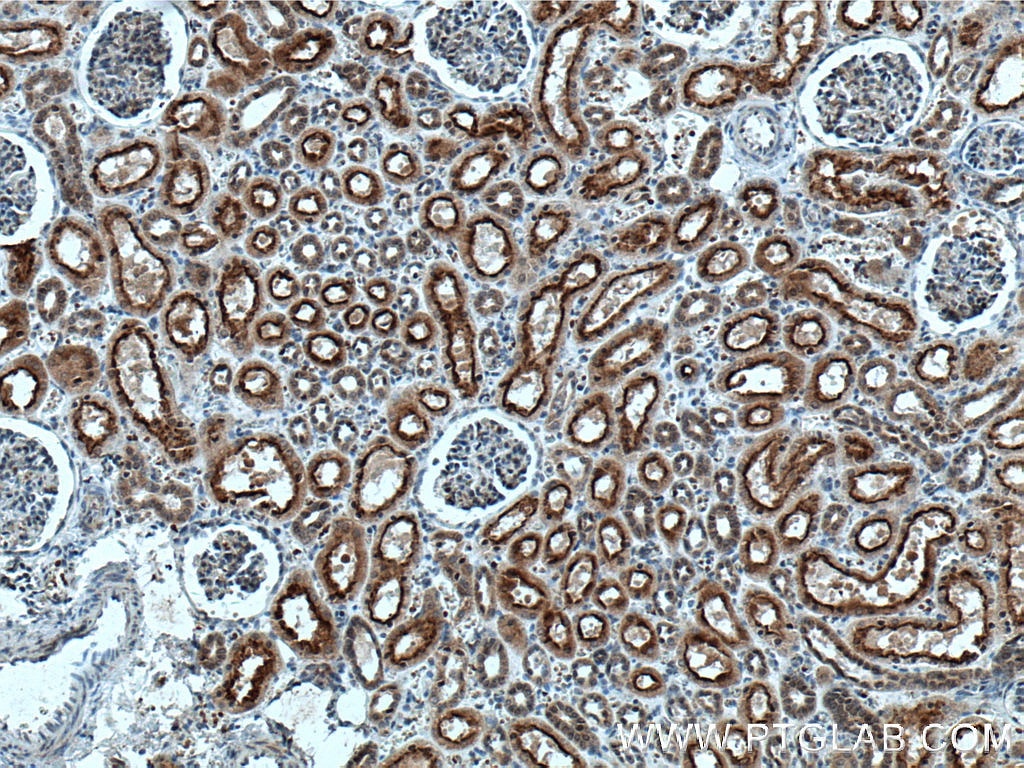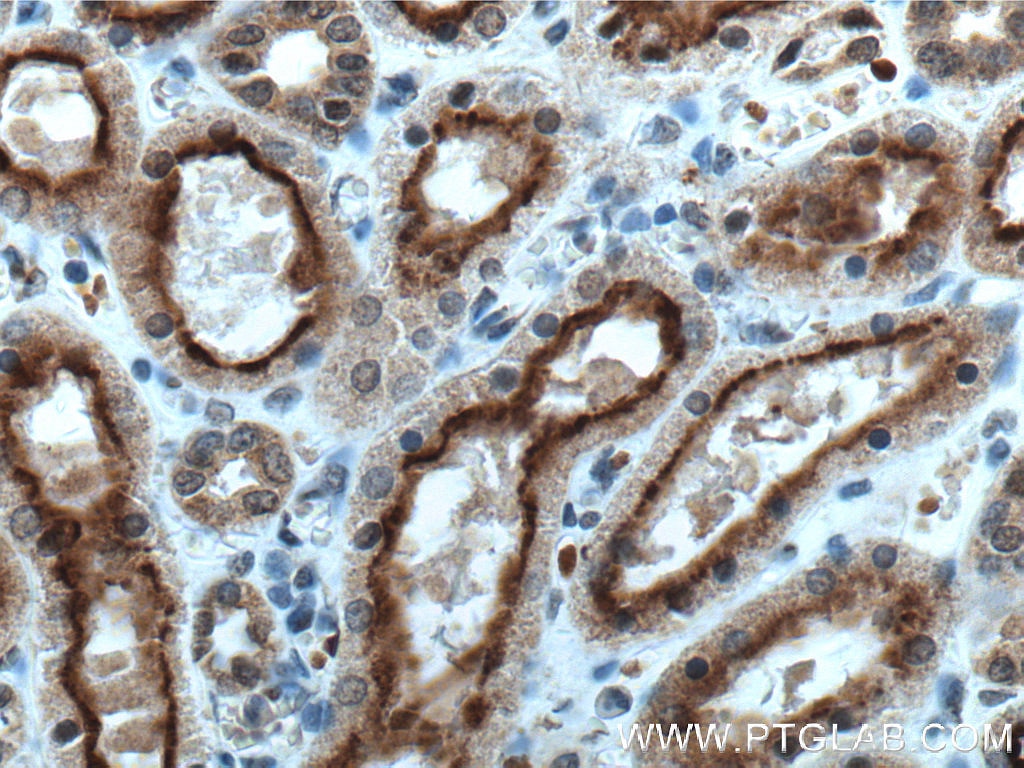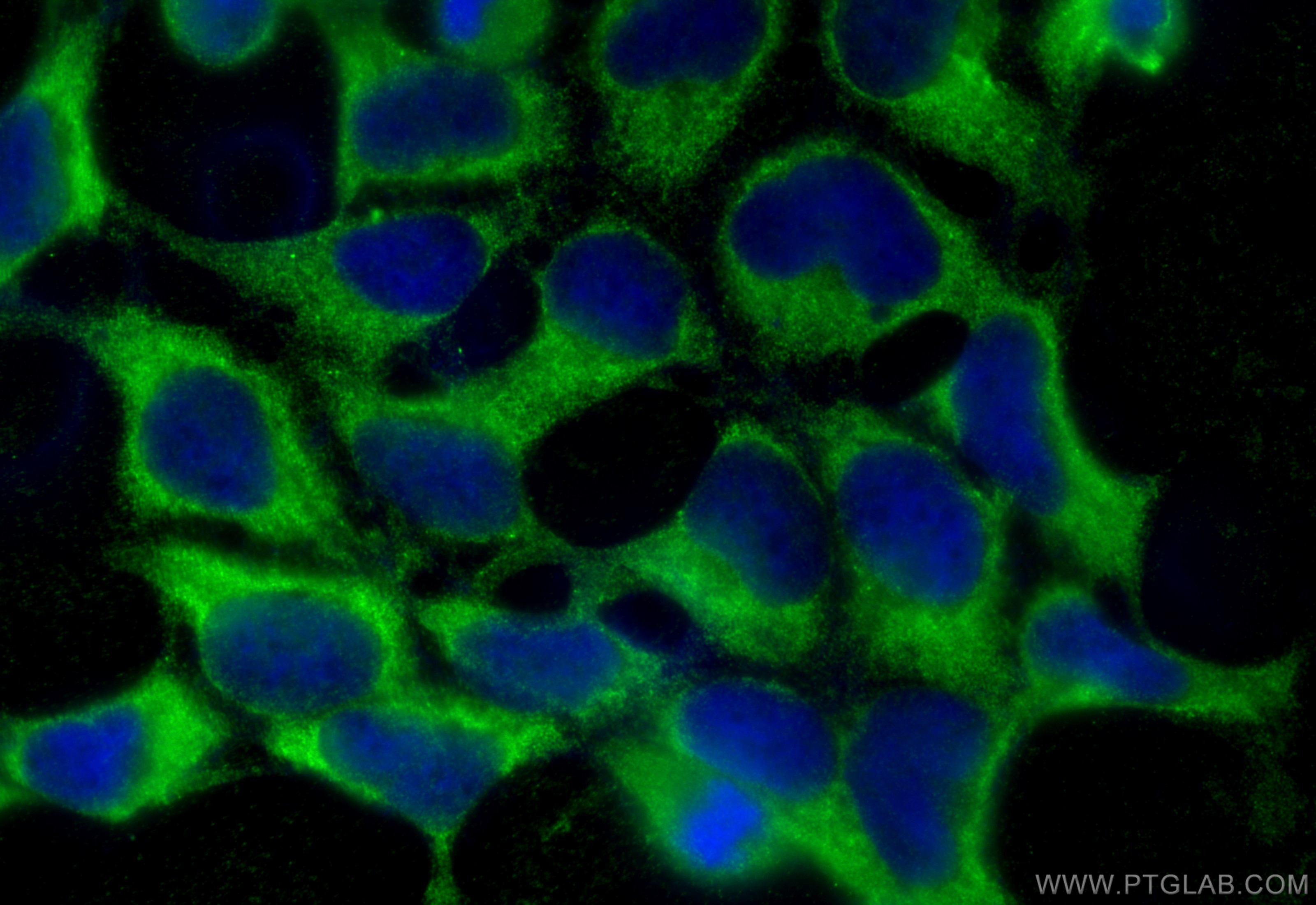- Featured Product
- KD/KO Validated
PHD2/EGLN1 Monoklonaler Antikörper
PHD2/EGLN1 Monoklonal Antikörper für WB, IHC, IF/ICC, ELISA
Wirt / Isotyp
Maus / IgG1
Getestete Reaktivität
Hausschwein, human, Maus, Ratte
Anwendung
WB, IHC, IF/ICC, ELISA
Konjugation
Unkonjugiert
CloneNo.
1A2F1
Kat-Nr. : 66589-1-Ig
Synonyme
Geprüfte Anwendungen
| Erfolgreiche Detektion in WB | Maushirngewebe, HEK-293-Zellen, Hausschwein-Hirngewebe, SH-SY5Y-Zellen |
| Erfolgreiche Detektion in IHC | humanes Hodengewebe, humanes Nierengewebe Hinweis: Antigendemaskierung mit TE-Puffer pH 9,0 empfohlen. (*) Wahlweise kann die Antigendemaskierung auch mit Citratpuffer pH 6,0 erfolgen. |
| Erfolgreiche Detektion in IF/ICC | HEK-293-Zellen |
Empfohlene Verdünnung
| Anwendung | Verdünnung |
|---|---|
| Western Blot (WB) | WB : 1:1000-1:6000 |
| Immunhistochemie (IHC) | IHC : 1:150-1:600 |
| Immunfluoreszenz (IF)/ICC | IF/ICC : 1:400-1:1600 |
| It is recommended that this reagent should be titrated in each testing system to obtain optimal results. | |
| Sample-dependent, check data in validation data gallery | |
Veröffentlichte Anwendungen
| KD/KO | See 1 publications below |
| WB | See 3 publications below |
| IF | See 2 publications below |
Produktinformation
66589-1-Ig bindet in WB, IHC, IF/ICC, ELISA PHD2/EGLN1 und zeigt Reaktivität mit Hausschwein, human, Maus, Ratten
| Getestete Reaktivität | Hausschwein, human, Maus, Ratte |
| In Publikationen genannte Reaktivität | Maus |
| Wirt / Isotyp | Maus / IgG1 |
| Klonalität | Monoklonal |
| Typ | Antikörper |
| Immunogen | Peptid |
| Vollständiger Name | egl nine homolog 1 (C. elegans) |
| Berechnetes Molekulargewicht | 46 kDa |
| Beobachtetes Molekulargewicht | 46 kDa, 44 kDa, 36 kDa |
| GenBank-Zugangsnummer | NM_022051 |
| Gene symbol | PHD2/EGLN1 |
| Gene ID (NCBI) | 54583 |
| Konjugation | Unkonjugiert |
| Form | Liquid |
| Reinigungsmethode | Protein-G-Reinigung |
| Lagerungspuffer | PBS with 0.02% sodium azide and 50% glycerol |
| Lagerungsbedingungen | Bei -20°C lagern. Nach dem Versand ein Jahr lang stabil Aliquotieren ist bei -20oC Lagerung nicht notwendig. 20ul Größen enthalten 0,1% BSA. |
Hintergrundinformationen
EGLN1, also named as PHD2, SM-20, HPH-2 and HIF-PH2, catalyzes the post-translational formation of 4-hydroxyproline in hypoxia-inducible factor (HIF) alpha proteins. It hydroxylates HIF-1 alpha at 'Pro-402' and 'Pro-564', and HIF-2 alpha. EGLN1 functions as a cellular oxygen sensor and, under normoxic conditions, targets HIF through the hydroxylation for proteasomal degradation via the von Hippel-Lindau ubiquitination complex. Defects in EGLN1 are the cause of erythrocytosis familial type 3 (ECYT3). EGLN1 has 3 isoforms with MW of 46 kDa, 44 kDa and 36 kDa produced by alternative splicing. It mainly localizes in cytoplasm and can shuttle between the nucleus and cytoplasm (PubMed:19631610). The antibody is specific to EGLN1.
Protokolle
| PRODUKTSPEZIFISCHE PROTOKOLLE | |
|---|---|
| WB protocol for PHD2/EGLN1 antibody 66589-1-Ig | Protokoll herunterladen |
| IHC protocol for PHD2/EGLN1 antibody 66589-1-Ig | Protokoll herunterladenl |
| IF protocol for PHD2/EGLN1 antibody 66589-1-Ig | Protokoll herunterladen |
| STANDARD-PROTOKOLLE | |
|---|---|
| Klicken Sie hier, um unsere Standardprotokolle anzuzeigen |
Publikationen
| Species | Application | Title |
|---|---|---|
Front Cell Dev Biol Hypoxia-Inducible Factor 2-Alpha Mediated Gene Sets Differentiate Pulmonary Arterial Hypertension. | ||
J Transl Med Inhibition of OGFOD1 by FG4592 confers neuroprotection by activating unfolded protein response and autophagy after ischemic stroke
| ||
Phytomedicine Polydatin mitigates thrombosis by inhibiting PHD2-induced proline hydroxylation on collagen, reducing platelet adhesion | ||
Nutrients L-Theanine Mitigates Acute Alcoholic Intestinal Injury by Activating the HIF-1 Signaling Pathway to Regulate the TLR4/NF-κB/HIF-1α Axis in Mice |
